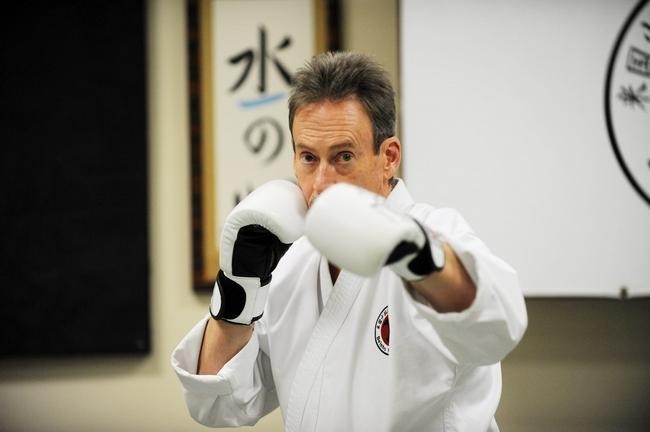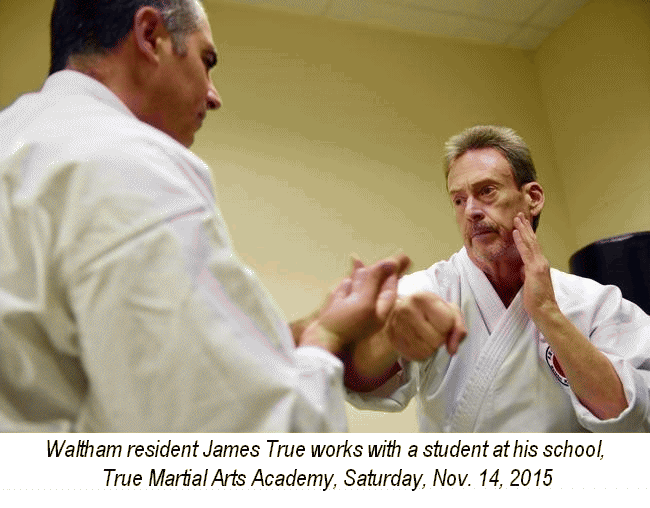|
|
True Martial Arts Academy Articles and Writings
This page contains articles and writings from True Martial Arts Academy instructors and students, as well as other karate articles of interest

Local celebrates 35 years teaching karate

Waltham resident James True takes a lesson from another instructor in boxing techniques at his school,
True Martial Arts Academy, Saturday, Nov. 14, 2015. Wicked Local staff photo / Kate Flock
By Bill Whelan
wwhelan@wickedlocal.com
Posted Nov. 19, 2015 at 9:24 AM
WALTHAM
By Bill Whelan
Anyone in Waltham with any martial arts experience is bound to know Jim True. True has been studying karate in Waltham since 1975, and has been teaching in the city for the past 35 years.
Last Saturday, he held a 40-year reunion at his dojo, the True Martial Arts Academy on Waverly Oaks Road, to celebrate his accomplishments, his students and his community. It is the latter two that have sustained him over the decades and helped him achieve what he has.
"It's an inner drive to be the best I can be and a sense of giving back and giving to others that motivates me," True said.
He began studying karate in 1975 after seeing a flyer for classes at the Waltham YMCA. True, 57, said he had always wanted to try martial arts growing up and watching Bruce Lee and other martial artists on TV and in movies.
After being promoted to black belt, True began teaching karate part-time in 1979 from a small garage he rented with no windows and no heat. He said in 1981 he made a conscious decision that teaching karate is what he was going to do in life. He rented a larger space on Elm Street for 11 years and then moved to an even larger space on River Street when demand grew during the "Ninja Turtle boom" in the early 90s.
True, however, knew that he had to branch out in order to survive as a business.
"If I stuck with just karate I'd go the way of the dinosaur," he said.
 True was able to broaden his scope by teaching self-defense and anti-bullying afterschool programs to young students in Waltham. At the same time, he began teaching Tai Chi to senior citizens at independent living homes. He has also taught martial arts and self-defense at both Bentley and Brandeis universities over the years.
True was able to broaden his scope by teaching self-defense and anti-bullying afterschool programs to young students in Waltham. At the same time, he began teaching Tai Chi to senior citizens at independent living homes. He has also taught martial arts and self-defense at both Bentley and Brandeis universities over the years.
Over the course of a normal day, True may have to change his energy level and teaching style multiple times based on what age group or class he's instructing, as he teaches six to nine classes a day.
"I may have to go from seniors to college kids and immediately change energy levels," he said. "I love it."
While True said he loves being able to share his knowledge and training with his students, it's what his students give back to him that keep him going.
According to True, he's taught thousands of students, and only promoted about 140 of them to the level of black belt.
"It's a real tearjerker. It's emotional," he said.
The process takes years. True said he has his students write an essay on what they first perceived a black belt to be, how that's changed over the years, and the challenges they've faced in reaching the level of black belt.
He said over the years, students have come and gone and some have made him a part of his or her life, one even invited him to his wedding.
On another occasion, True said he received a phone call out of the blue from a student named Adam. True taught Adam when he was a boy, and Adam said True told him to give him a call when he turned 18, which is exactly what Adam did.
True said Adam struggled with weight issues as a child and the two developed a mantra to help him overcome them.
True said that Adam called him just to thank him, "For telling him, 'You'll be OK.'"
"Those are the moments that bring it all home," True said.
Beisho Summer Camp
by Owen Davidson
I had the opportunity of going to Beisho camp this summer and last, and it was well worth my while. I've been practicing karate for about seven years now, and am a sixteen year old Shodan. I usually attend classes with other teens when I'm at my own dojo, which means I tend to be the highest student rank in the room. The reverse is true at camp, where most people are not only black belts but are also higher Dan than I am. Though I am among the lowest in rank, I felt very welcomed at camp. Everyone had a spirit of kindness and camaraderie, but at the same time they were ready to work. I found it helpful to be able to be advised by a variety of senior ranks, giving me pointers on drills, techniques and kata. The great thing about camp is that even when I feel confident in the material I know, camp exposes me to higher ranks practicing kata I've never done (or for most part even seen) with finesse I can hardly imagine, pushing me to reach farther in my journey up the mountain of knowledge and experience which is karate.
I also enjoyed the focus on real world situations. I liked being able to apply my experience to practical ends, and also learn new self defense techniques. One thing that Papa Chris mentioned was the idea of three levels of karate. The first is kata, in which you get to practice technique without another person involved, working on stances and power and timing, but without actually fighting someone. Then there are drills. These allow you to retain the rigid structure of kata, but add an opponent, along with more realism. Finally there is sparring and self defense, in which you get to apply techniques learned in the other two levels to real, dynamic situations. I like this concept of different levels of karate, and I think camp did a good job incorporating and teaching them all.
Of course, camp demands a rather high level of intensity, and I was usually sweating by the end of a session. After a taxing workout it was crucial that the camp experience outside the dojo be just as good as inside the dojo, and it was. We were very fortunate in having incredible accommodations at the hotel at which we stayed, including very comfortable beds, delicious meals, and even a refreshing swimming pool. Teens like myself were given a large degree of autonomy, able to socialize freely after class, either in our room or walking around the hotel grounds together. I greatly enjoyed the company of my age peers, but it was also nice talking to adults during meals and on the bus ride to and from camp. Ordinarily I only see other karatekas in the dojo, so it was interesting to get another perspective by talking to them in an informal setting.
Another enjoyable and informative aspect of camp outside the dojo was the tour of Gettysburg. Seeing the battlefield and imagining it as it must have been at the height of the battle was truly breathtaking. Papa Chris related the events of the three days of the battle and described the significance of the various monuments which commemorate the soldiers who fought there. I am rather fascinated by history myself, and it was nice to learn about it there, where it actually unfolded, rather than abstractly in a classroom. Papa Chris also spoke some about the history of our style, and him doing so gave an interesting layer of context to our kata and drills by allowing us to think of how they came to be.
I greatly encourage everyone, especially teens, to attend Beisho camp. I feel I benefitted immensely from seeing and interacting with higher belts, and I had a lot of fun throughout my experience.
Mission Trip
by Owen Davidson
The first week after school this summer I went with some of the member's of my church, St. Paul Lutheran in Arlington, on a mission trip to Warrensburg, New York. Warrensburg is a small rural town upstate, and for the last couple of years our church has done work with the community there through a program called YouthWorks. We helped scrape and paint at a cemetery, mulched at a farm, and overall had a very enjoyable community building experience.
Shorin-Ryu Karate Camp: A Teen's-Eye View
by Daniel Strauss
During my experience at karate camp, I not only became better at karate, but a better student of karate. When I arrived at camp, it was the "junior" part of junior black belt that showed; when I left, it was the "black belt."
At four in the morning, I stumbled onto the bus with my friend Jason. When we arrived in Gettysburg a little after noon, we settled into our room with Michael, our chaperone. Pretty soon, we were in our uniforms doing karate in the event hall of the hotel.
The group mostly comprised adult black belts, but there were also a fair number of teens. People came from Ohio and both Massachusetts dojos. Each day, we did seven hours of karate. At the beginning, we were in the "Black Belt Camp," which was only for black belts and junior black belts. The last two days were the "Budo Camp" which was open to the lower ranks as well. We started each of our three daily lessons with stretches, then proceeded to split into groups based roughly on rank. Some lessons we worked mainly on kata, while other times we would work on fighting. We learned and figured out a considerable amount of bunkai, or analysis of kata, which I loved. We would sometimes split into groups of mixed rank and have to compete against other teams. For example, one time we had a day or two to come up with a creative bunkai for a Pinan kata.
At camp, we not only benefited from practicing so much, but also from being exposed to different teaching styles. Papa Chris, Sensei Jim, Sensei Jayne, and Sensei Mike, as well as each of the other black belts who helped to instruct us, had unique ways of teaching, and each way was helpful.
The experience was not limited to karate, though. Each morning, we woke up early to do tai chi with Papa Chris, Sensei Jayne, and Sensei Jim. To fuel our bodies for all of the exercise, we ate lunch at a restaurant across the street, and had wonderful breakfasts and dinners prepared by the hotel staff. We ate most of our meals as a group, which let us socialize freely and make friends with the people from other dojos. One day, we took a tour of Gettysburg, led by Papa Chris.
For me, the camp was much more than a trip to Gettysburg and a lot of karate lessons. It was an experience that let me be immersed in the karate. I remember that before I attended the camp, I thought I was trying my hardest to be sharp and powerful in my movements, but I was actually sloppy. I didn't realize this until I had to spend most of my day doing karate, and only then could I correct myself and truly try my hardest.
|